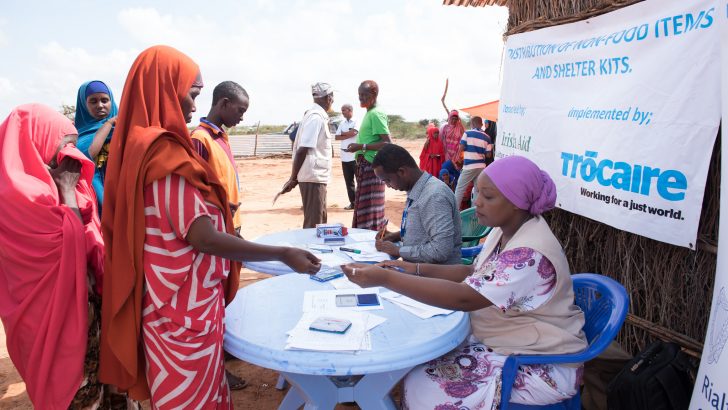Paul Healy
The entire world is hurting from the Covid-19 crisis, but it’s in places like Somalia where you see how the pandemic is tipping people who were already desperately poor over the edge.
Somalia is a country already struggling due to conflict and the awful impact of climate change. Now a global pandemic has been thrown in on top of everything else. It is a country I dearly love and it breaks my heart to see the people facing so many challenges to their very survival.
Devastation
Ireland knows only too well the devastation caused by Covid-19. Over 2,000 people have lost their lives, while many thousands more have lost their livelihoods. In countries like Somalia, the real damage being caused by the pandemic will only be known over the next few months. That is because it is over the coming months the food crisis sparked by this pandemic will be felt.
Trócaire runs four hospitals and 24 outreach centres in Gedo, a region of Somalia a little bit larger than Ireland. Despite its size, we are the only healthcare provider in Gedo.
We put a huge amount of effort into containing the virus. We trained over 400 staff and issued protective equipment to all of them. Our community health workers visited 125,000 people. We were able to do a lot of testing and contact tracing. It was a real challenge but we managed it.
Like in Ireland, people in Somalia lost their jobs and lost their ability to sell products. Unlike in Ireland, there is no safety net in Somalia. People unable to earn income are left with nothing. As well as casual labour being gone and markets being closed, remittances from abroad also collapsed. Just as Irish families used to rely on money being sent home from Britain or America, so many Somalis rely on those remittances. The global economic crisis has really been felt by those families.
On top of everything, a very bad drought meant that crops didn’t harvest. There has been very little rainfall this season. It should be raining now and it is bone dry. We’re now seeing a perfect storm of crises.
Malnutrition
Children are being re-admitted to Trócaire medical centres with severe acute malnutrition and that is a massive concern. What is even more alarming is that some children are being admitted to our centres with malnutrition, staying with us for six weeks and then being readmitted again shortly after. It shows how deep the crisis is.
Somalia was already one of the most fragile and complex countries in the world to manage large health projects, but the Covid crisis has made it even more complicated. It is already a challenge dealing with malnutrition, chronic disease and water borne diseases. To have Covid-19 on top of that has stretched our resources. We have had to create new centres for isolation wards. We have had to train staff. We have had to spend a lot of money on doing that rather than focusing on what we were set up to do which is care for mothers and children under the age of five.
All of these stresses have created an environment where the health services that we provide are under serious strain. Our resources are obviously finite but we do the best we can with what we have. For example, one nurse midwife carried out over 250 successful deliveries on her own last month. The strain on the staff is significant when you are trying to manage Covid-19 and malnutrition as well as normal health services.
My biggest worry is that we won’t have enough food and we won’t have enough staff to respond to the emerging crisis. That is always my fear; that the people in Gedo won’t have enough.
The locals in Gedo call Trócaire ‘the mother of health’. That is something people back home in Ireland should be incredibly proud of. The health systems we have put in place are there because of them. We have been here for almost 30 years. People here really rely on us.
When it comes to helping our less fortunate brothers and sisters who are struggling, there is nobody better to stand up and respond than the people of Ireland.
The next six months are going to be really tough. People in Somalia know that people back in Ireland are standing with them. That is really important for them. It is important for me too. The support we receive from parishioners all over Ireland gives me great energy. It gives me the hope to keep going.
To donate to Trócaire’s Christmas Appeal, you can visit trocaire.org or call 1850 408 408 (0800 912 1200 NI).


 There is an overwhelming respect and appreciation for the work of St. Vincent de Paul and Trocaire.
There is an overwhelming respect and appreciation for the work of St. Vincent de Paul and Trocaire. 